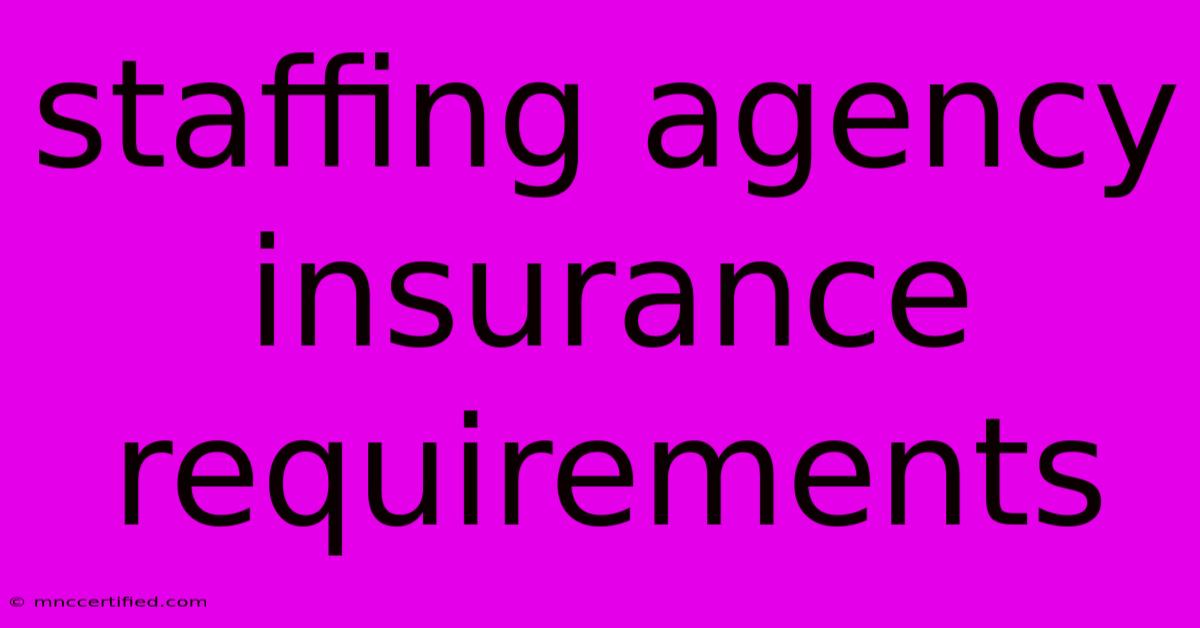Staffing Agency Insurance Requirements

Table of Contents
Staffing Agency Insurance: Essential Coverage for Your Business
Running a staffing agency is a rewarding but complex endeavor. You're responsible for connecting talented individuals with suitable employment opportunities while navigating the intricacies of labor laws and regulations. Ensuring your agency is adequately insured is paramount to safeguarding your business and protecting your financial well-being.
This comprehensive guide will delve into the essential insurance requirements for staffing agencies, providing insights into the types of coverage you need, key considerations, and strategies for maximizing your protection.
Understanding Staffing Agency Risks
Before diving into specific insurance policies, it's crucial to understand the unique risks inherent in the staffing industry:
- Worker's Compensation: As an employer, you're legally obligated to provide worker's compensation insurance for all employees, including temporary workers placed through your agency. This covers medical expenses, lost wages, and disability benefits in case of work-related injuries or illnesses.
- General Liability: Protects your agency from claims arising from property damage, bodily injury, or advertising injury caused by your employees or operations. This is crucial for covering potential lawsuits from clients or temporary workers.
- Professional Liability (Errors & Omissions): This policy protects your agency from financial losses arising from professional negligence, such as misplacing employee files, providing inaccurate information, or failing to properly screen candidates.
- Employment Practices Liability: This insurance safeguards your agency against claims related to wrongful termination, discrimination, harassment, or other employment practices violations.
- Cyber Liability: In today's digital age, cyber threats are a real concern. Cyber liability insurance helps cover losses resulting from data breaches, cyberattacks, and other digital security incidents.
- Surety Bonds: Depending on your state and specific operations, you may need surety bonds to cover financial obligations, like fulfilling contracts or handling employee payroll.
Key Considerations for Staffing Agency Insurance
Choosing the right insurance coverage involves a careful assessment of your specific needs and risks:
- State Regulations: Familiarize yourself with state laws governing staffing agencies, as requirements for specific coverage types may vary.
- Agency Size and Scope: The size and scope of your agency will influence the amount of coverage required. Larger agencies with more employees and higher payrolls will need greater coverage limits.
- Industry Specific Risks: Some industries, such as healthcare staffing, have unique risks that require specialized coverage, like medical malpractice insurance.
- Contractual Obligations: Review your contracts with clients, as they may require specific insurance coverage or minimum limits.
- Consult with an Insurance Broker: A qualified insurance broker can provide tailored guidance based on your agency's specific circumstances and help you secure competitive rates.
Maximizing Your Insurance Protection
- Thorough Risk Assessment: Conduct a comprehensive risk assessment to identify potential hazards and exposures, informing your insurance needs.
- Employee Screening: Implement robust employee screening processes to mitigate the risk of negligence or misconduct.
- Compliance Programs: Develop strong compliance programs to adhere to labor laws and regulations, minimizing potential legal issues.
- Regular Policy Review: Review your insurance policies periodically to ensure they continue to meet your evolving needs and reflect current industry standards.
Conclusion
Adequate insurance is vital for the success and stability of your staffing agency. By understanding the specific risks, choosing the right coverage, and implementing proactive risk management strategies, you can minimize potential financial losses and focus on building a successful and sustainable business.
Remember to consult with a qualified insurance broker to tailor your insurance program to your agency's unique needs and ensure you're fully protected against potential liabilities.

Thank you for visiting our website wich cover about Staffing Agency Insurance Requirements. We hope the information provided has been useful to you. Feel free to contact us if you have any questions or need further assistance. See you next time and dont miss to bookmark.
Featured Posts
-
Highlights Pakistan Triumphs Over Australia
Nov 09, 2024
-
Pompeii Casts Research Uncovers Hidden Truths
Nov 09, 2024
-
Heretic Ending Explained Beck And Bryan
Nov 09, 2024
-
Advanced Research Investment Solutions
Nov 09, 2024
-
D4346 Dental Code Covered By Insurance
Nov 09, 2024